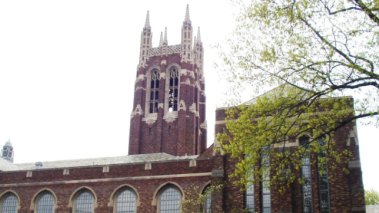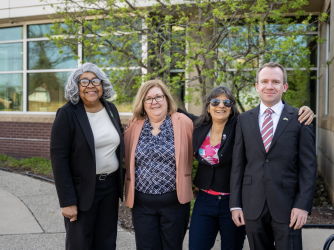Table of Contents
New York Divinity School Disinvites Pro-Palestinian Speaker

Speaker disinvitations on college campuses tend to start long before commencement season, and this year is no exception. New York’s Colgate Rochester Crozer Divinity School (CRCDS) appears to be this academic year’s first offender.
Working with Rochester-based church group Christians Witnessing for Palestine, CRCDS scheduled a September 24 speaking event for Rev. Graylan Hagler, a Palestinian-rights advocate and senior pastor at Plymouth United Church of Christ. But, as happens all too often with controversial speakers, complaints began to roll in from outside groups who opposed CRCDS’ decision to invite Hagler.
Roc4Israel, a group dedicated to “counter[ing] the negative rhetoric towards Israel,” sent 500 flyers to Rochester-area homes opposing Hagler’s views, and the Jewish Confederation of Greater Rochester “expressed concerns” about Hagler’s speech as well.
After learning death threats were made against Hagler, CRCDS succumbed to pressure to cancel the event, announcing that it was “no longer prepared to allow this lecture to take place” because it was unwilling to provide the funds it felt would be needed to ensure security for the event. However, according to CRCDS President Marvin McMickle, the death threats were not the sole basis for cancellation of Hagler’s speech. The Democrat & Chronicle reports:
"Sadly, in this case neither we nor Christians Witnessing for Palestine did an adequate job of vetting and reviewing the particular speaker's message and recent history," said McMickle's statement.
He also said the fact that Hagler's lecture "coincides with Yom Kippur further convinced us of the appropriateness of our decision."
McMickle’s statement walking back Hagler’s invitation is predictable, considering how often colleges fold under pressure from groups like those who were demanding Hagler’s disinvitation.
CRCDS is a divinity school and, because of that, its promises of freedom of expression are unsurprisingly weaker than those of most private institutions. For example, the college’s “Statement on Student Conduct” states students must foster an environment of “respect for the dignity of others,” a value that can often clash with free and open debate.
However, in that same statement CRCDS characterizes its community as one defined by “free expression, free inquiry” and “intellectual honesty.” A college community claiming to appreciate the freedoms of expression and inquiry is not one that disinvites speakers simply because some groups—especially off-campus groups—are offended by what that speaker has to say.
Hagler’s speech was ultimately hosted at a different location in Rochester by the local chapter of Jewish Voice for Peace. It’s reassuring when outside venues are willing to host controversial speakers after colleges choose to disinvite them, but it’s regrettable that they must be called upon to do so in the first place.
FIRE hopes other colleges and universities don’t follow in CRCDS’ footsteps this fall semester.
Recent Articles
FIRE’s award-winning Newsdesk covers the free speech news you need to stay informed.

VICTORY: Michigan town declares Sept. 6 ‘First Amendment Day’ after FIRE sues its mayor for shouting down residents

USC canceling valedictorian’s commencement speech looks like calculated censorship

Back into the FIRE: Hasen’s response to FIRE and Rohde: Don’t read the press clause out of the Constitution — First Amendment News 420
